The most happening place in Huanlien County’s sleepy Fengtian (豐田) is an old Japanese thatched hut next to the train station, now known as the 5-Way House (五味屋). A thrift store run by disadvantaged rural youth, the name refers to the five flavors of life that one can experience here.
Customers browse second-hand goods in the front, while a group of local and visiting teenagers work on pricing the newly-arrived items. In the back room, an instructor is teaching local children how to bake tarts while college volunteers help out.
Behind the hut, other youngsters are processing roselle calyces that they grew themselves to make into candied sweets and other products. The used clothing store across the street is also open, and at the nearby used bookstore, a spatial design team from Tainan National University of the Arts is planning 5-Way House’s new space, which will partially be used to package the rice that the children grow in conjunction with local farmers.
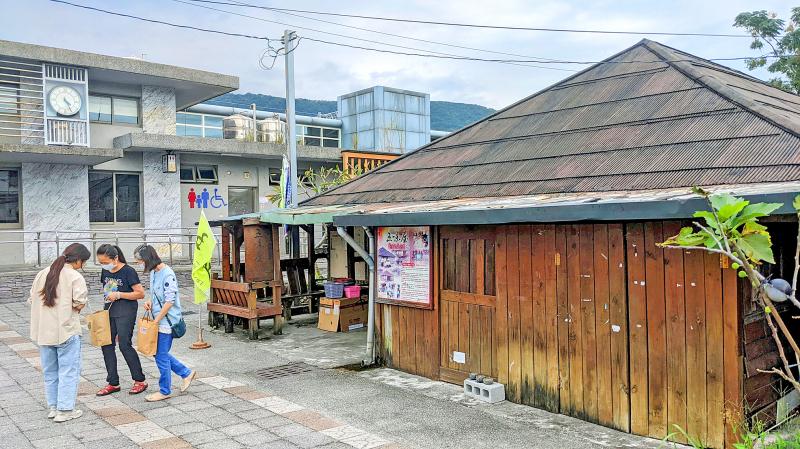
Photo: Han Cheung, Taipei Times
5-Way House founder Ku Yu-Chun (顧瑜君) is in the center of all this activity, moving between rooms, working with each group and dealing with any problems calmly but firmly. It usually isn’t this busy, she says — usually the activities revolve around the youngsters learning how to run the stores and help out in other areas.
The Donghwa University professor set up the social enterprise in 2008 to give these youth confidence, communication and critical thinking skills as there are few resources in the small town, especially for those coming from broken homes.
Their lack of self esteem is compounded by the common notion that the only way to “succeed” is to leave the countryside, which makes residents — and the education system — ignore what rural life has to offer. Instead of focusing on what Fengtian lacks, Ku hopes that 5-Way House’s programs help them appreciate what they have.
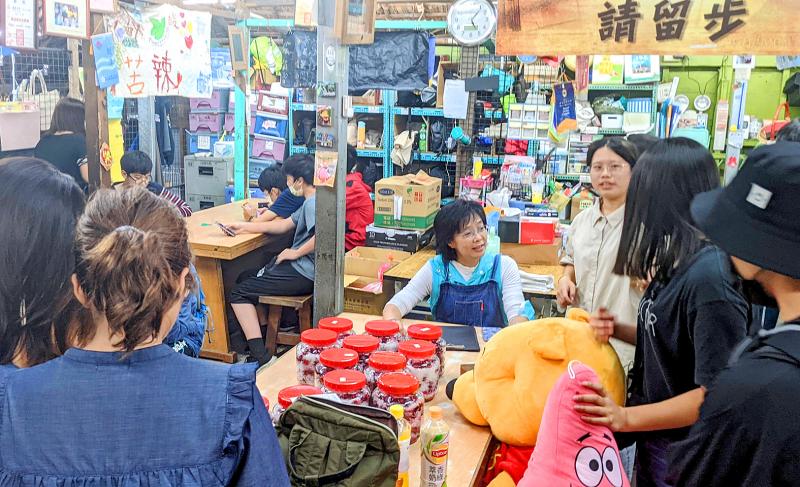
Photo: Han Cheung, Taipei Times
Today, 5-Way House has expanded to 12 spots around the farming village, seeking to provide a varied and comprehensive rural-learning experience.
EMOTIONAL MANAGEMENT
The kids are also trained in public speaking through sharing their stories at events around Taiwan, and giving tours to visitors. My guide is Hsu Wen-hao (許文浩), a college freshman who has been with 5-Way House since he was in the fourth grade. He met Ku while his father was in the hospital, and started coming regularly after his father passed away.
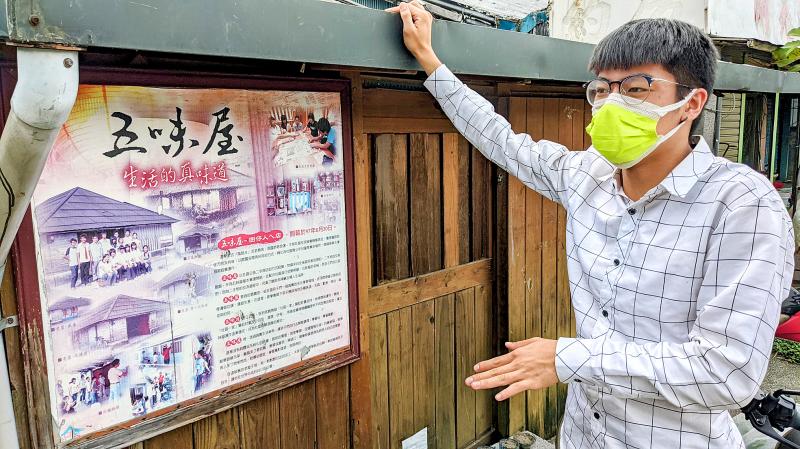
Photo: Han Cheung, Taipei Times
“I was afraid at first because it was so lively and full of people,” he says. “But gradually, I began to see this place as another home. When I see the kids today, I see myself in the past.”
Hsu and his buddy Chou Hsiang (周翔), who also spent a few years at 5-Way House, appear polite and articulate now, but they say they learned how to be that way through their time there. They say that many children who come have emotional problems and are prone to outbursts.
“Like a ticking time bomb,” Chou says.

Photo: Han Cheung, Taipei Times
Hsu says that he learned to control his emotions and pay attention to how he treat others and be aware of his tone when speaking to others.
“I was a mischievous kid,” he says.
Chou says he was dragged to 5-Way House by his grandmother in the fifth grade, as he was not doing well academically and frequently getting into trouble.
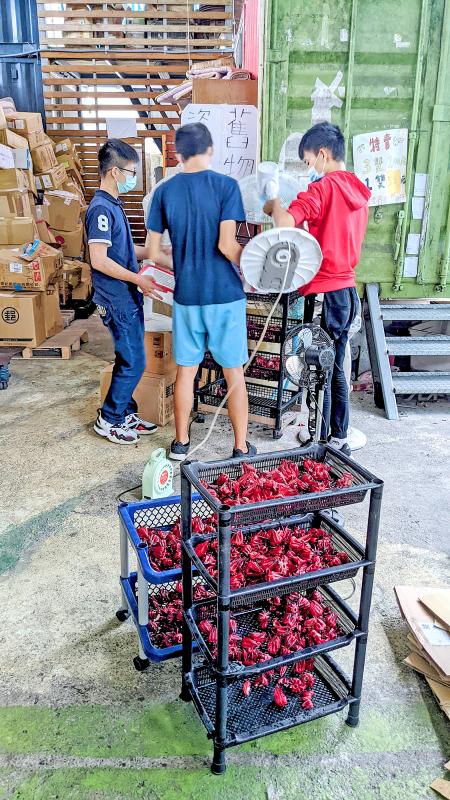
Photo: Han Cheung, Taipei Times
“This place gives kids a good foundation,” he says. “It’s okay if they have a brash attitude when they come, at least they won’t get worse here. I learned how to work properly and how to respect others.”
Hsu brings me to one of the stores, which is filled wall-to-wall with all sorts of stuffed toys. This is 5-Way House’s latest venture, opened last year with the help of Claire Wang (王婉諭), the mother of the four-year-old “Little Light Bulb” who was tragically killed in 2016 in a random attack. Plushies and other toys accumulated at the murder site in memory of the victim, and Wang decided to give 206 of them to 5-Way House.
With the help of construction workers and designers, the youngsters were tasked with arranging and setting up the new space. Again, they say the biggest challenge was learning to cooperate — there were many temper tantrums, arguments and throwing of items. Eventually, however, they pull through.
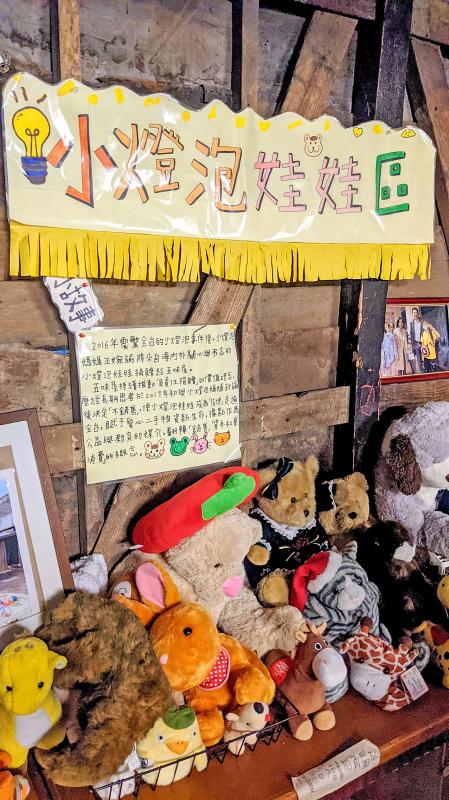
Photo: Han Cheung, Taipei Times
EXCHANGE OPPORTUNITIES
The group of visiting teens are from an experimental junior high school in rural Yunlin County, and helping out here is part of their field trip to Hualien. Visiting students generally come from more privileged backgrounds, Ku says, and it’s beneficial to have the two groups interact. They also host visitors or volunteers from other countries, which helps connect the youth to the outside world.
“The kids are tasked with bringing the foreign visitors around,” Ku says. “Unlike in a school, there’s no itinerary, they don’t need to know English, they just figure it out on their own. Often they’re gone for a whole day. It gives them confidence. They don’t need to be good at English before they can make foreign friends.”
This is part of 5-Way House’s more recent tourism venture. Ku hopes that visitors don’t just come to consume or be served, but to help out, learn and get to know the community.
The students stay at 5-Way House’s guesthouse, which doesn’t serve breakfast, instead encouraging the visiting students to go out and interact with local breakfast shops. If they stay for longer, 5-Way House can arrange for a local to come cook for them and talk about local produce and food customs, or even teach them how to cook.
“The laborer becomes the teacher in this case, and they feel appreciated more. It’s not just a transaction, but we’re building connections between people,” Ku says.
Most of the families here don’t have the means to send their children abroad, but 17-year-old Kuo-hsuan (國瑄), who has mild developmental disabilities, has been to Japan three times. Most youngsters get store credit for their time working, but they can also sign up to do extra work in order to join the international exchange programs that 5-Way House has with other groups, such as Tenrikyo Church in Japan.
The five-day exchange to Japan is free, but Kuo-hsuan still has to earn money to sightsee for a few days before and after the program, as well as airfare. At first, his father was able to put in half of the money, but later he could no longer afford to. Since the events are time sensitive, they can travel first and pay back the money later.
“Even if they can just put in NT$100, we hope that the parents are involved,” Ku says. “We don’t want to make them welfare dependent.”
Besides all these programs, Ku says they also do social work behind the scenes with the children’s families. People clear out of the hut as night falls, but Ku and some of the staff are still getting ready to deal with a kid who ran away from home.
For more information, visit 5wayhouse.weebly.com

June 2 to June 8 Taiwan’s woodcutters believe that if they see even one speck of red in their cooked rice, no matter how small, an accident is going to happen. Peng Chin-tian (彭錦田) swears that this has proven to be true at every stop during his decades-long career in the logging industry. Along with mining, timber harvesting was once considered the most dangerous profession in Taiwan. Not only were mishaps common during all stages of processing, it was difficult to transport the injured to get medical treatment. Many died during the arduous journey. Peng recounts some of his accidents in

“Why does Taiwan identity decline?”a group of researchers lead by University of Nevada political scientist Austin Wang (王宏恩) asked in a recent paper. After all, it is not difficult to explain the rise in Taiwanese identity after the early 1990s. But no model predicted its decline during the 2016-2018 period, they say. After testing various alternative explanations, Wang et al argue that the fall-off in Taiwanese identity during that period is related to voter hedging based on the performance of the Democratic Progressive Party (DPP). Since the DPP is perceived as the guardian of Taiwan identity, when it performs well,

A short walk beneath the dense Amazon canopy, the forest abruptly opens up. Fallen logs are rotting, the trees grow sparser and the temperature rises in places sunlight hits the ground. This is what 24 years of severe drought looks like in the world’s largest rainforest. But this patch of degraded forest, about the size of a soccer field, is a scientific experiment. Launched in 2000 by Brazilian and British scientists, Esecaflor — short for “Forest Drought Study Project” in Portuguese — set out to simulate a future in which the changing climate could deplete the Amazon of rainfall. It is

The Taiwan People’s Party (TPP) on May 18 held a rally in Taichung to mark the anniversary of President William Lai’s (賴清德) inauguration on May 20. The title of the rally could be loosely translated to “May 18 recall fraudulent goods” (518退貨ㄌㄨㄚˋ!). Unlike in English, where the terms are the same, “recall” (退貨) in this context refers to product recalls due to damaged, defective or fraudulent merchandise, not the political recalls (罷免) currently dominating the headlines. I attended the rally to determine if the impression was correct that the TPP under party Chairman Huang Kuo-Chang (黃國昌) had little of a